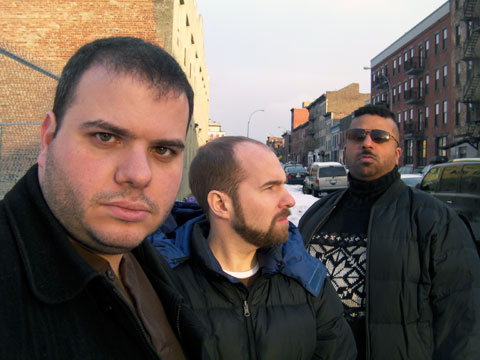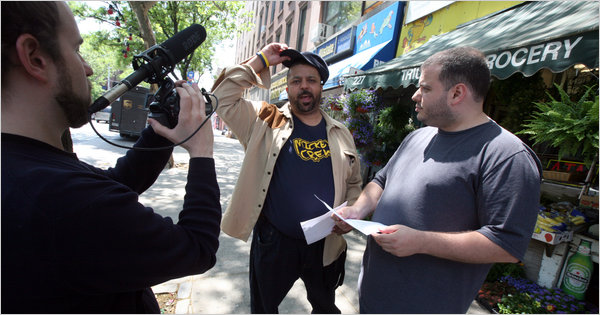My mom asks: “How many movies do you have on youtube now?”
“48”
“Oh.” She chooses her words carefully. “ I hope you don’t wake up at 40 with just 100 movies to show for it.”
Clearly, to her, short films still retain the traditional stigma of unimportant filmmaking. 100 short films would just be 100 pieces of a compromised totality.
I contend that this is an exciting time for short films with lots of places that want them and the average attention span of the average viewer getting shorter and shorter. More can be said in a smaller period of time – blah blah blah.
That was the kneejerk response I had to my mom’s statement – wherein I defended short films as a viable form and posed the comparison of 100 good shorts against 2-3 mediocre to crappy features. But her purpose wasn’t to denigrate shorts. I think she was just making sure that what I was doing was what I wanted to be doing – that it wasn’t just habitual.
Would 100 or whatever the amount of short videos I’m on pace to make by 40 be a satisfying goal for me?
Even though it’s kind of a misleading point-of-view, I sometimes look at my output with a legacy mindframe. Would I be happy having made this? Would I be happy having made that? Despite it being natural, this impulse feels misleading because it implies a life lived intending to serve one (hopefully) very distant moment of reflection. But it is a type of narcissism that puts your work into perspective. It makes you render the short view you take for granted with the long view superimposed over it.
I’ve wanted to make movies since I was 14. And I thought for a while that how to do this would become obvious if I was flexible enough. It took me a while to acknowledge that beyond developing a spectrum of necessary skills and experience, filmmaking involves answering a lot of hard questions. I think that’s true for any major life choice. You have to basically seal off paths so that you don’t get sidetracked or even worse, lost. You answer questions about what you want to do to make sure it’s specifically what you want to do or in service of that mission.
I bring this all up because I’ve been fascinated lately with all the possible permutations of goals available to the ambitious filmmaker or filmmaking group out there. With the internets going nuts and more and more places hungry for content, there are a huge amount of micro-goals. There are more ways than ever to make money, achieve artistic satisfaction and compromise one’s films and/or identity as a filmmaker. The ICs lately have had some emails back and forth about what our goals are and despite all seemingly being after the same prize (success in all its vague possibility), I wouldn’t say that we were able to answer all of the questions in front of us. Nor did I get the impression that we’d even asked all of the possible questions.
Our origin – as Dallas touched on a few posts back – was fairly serendipitous. Our first movie is still our most popular – in terms of number of views (or hateful comments – whichever you trust more as a metric) – and it was born of 2 hours of filming, 15 minutes after Rafi and I met Dallas for the first time.
Considering we barely prepared for that movie, there is a feeling of leaving things up to chance, of not taking the time to prepare and letting the chips fall where they may in future movies. Why ask questions? Just keep getting together with a camera and a concept and let ‘er rip.
But choosing happenstance as a key function of our aesthetic would be like basically choosing the laziest goal we could. Why not try and refine the strategy and get on the same page in terms of intention? Once your intentions are in sync, you become a much more efficient filmmaking squad. Ideas that don’t mesh with that intention can be thrown out with little dialogue and your energy can be focused on a more narrow field.
So here are some of the questions we were considering:
- Should we only make movies about one topic? (i.e. food, social justice, etc.)
- Should we try to make money?
- Should we try to make A LOT of money?
- Should we let money just kind of happen?
- Should we make lots of movies?
- Should there be a schedule to our output?
- A new movie every month? Every week? Every year?
- Should every movie be above a certain standard of goodness?
- Or should we let a couple of lesser movies squeak through because they cover a timely topic?
- Should timeliness trump quality?
- If we do decide to make money, how should we do it?
- Should we go after sponsorship?
- Should we charge people to see our movies?
- Should we try to make a DVD and sell it?
- Should we try to get signed to a website or channel with budgets for filmmakers?
- Should we just make the movies that we want to make having faith that good ideas will breed funding?
- Should we make movies for the Internet only?
- Should we consider how something is going to look at a film festival?
- Are we trying to get picked up as a TV show?
- Fuck TV!
The obsessive part of my personality likes the idea of creating this kind of questionnaire. Were we to establish that we only wanted to make monthly, lucrative movies about food above a certain level of goodness which we didn’t charge people for in the hopes of landing a sponsorship and playing on TV, we could close off the other circuits and narrow our focus.
The downside (besides eliminating some of the spontaneous discovery that I think filmmakers like myself tend to appreciate) is that we would have to live with those choices.
Goals are a hard thing to consider because they’re not like the goals you have when you’re a kid. When I was 14, my goal was to be a filmmaker. Now, my goals in terms of movie-making seem to be (in this order):
- Making LOTS of moves capable of being seen on multiple platforms.
- Making short videos that play almost exclusively on youtube where hopefully they get seen by lots of people.
- Making short documentaries about food, holding New York City accountable for its discrepancies and rap shows.
- Making music videos for my friends’ bands.
- Making short comedies.
- Writing/Conceptualizing a good feature that my friends and I can make
- Narrative or Documentary
- Writing a good feature that someone else can make which hopefully pays well
- Making commercials which are artistically satisfying and pay well
- Letting money just kind of happen
- Getting shorts into film festivals
Ask me on a different day and the goals change order, develop new tangents and inspire doubt. But I think breaking your mission into categories, parts and interchangeable pieces ensures you’re thinking about your work and makes it more doable. You keep moving the parts around and ultimately, you develop your life.
So to return to my mom’s query: Would I be happy having made 100 shorts by the time I’m 40?
The answer is no.
But I might be happy having made 200 shorts, 1 excellent feature (narrative or documentary), 1 well-written but ultimately unsuccessful feature, 50 artistically satisfying and lucrative commercials while seeing a couple of those shorts play Sundance, Tribeca and Clermont-Ferrand – and being funded by a wealthy patroness of the arts.


4 Responses to Goals
David April 15, 2008
Interesting, just yesterday I saw a blog post that talked about Steve Martin’s method to reaching success. His strategy was to “be so good they can’t ignore you” but his method to implement the strategy was “if you don’t saturate your life in a single quest, you’ll dilute your focus to a point where becoming outstanding becomes out of reach.”
Don’t remember where I got the link from: http://calnewport.com/blog/2008/02/01/the-steve-martin-method-a-master-comedians-advice-for-becoming-famous/
Seems like you came to a somewhat similar conclusion conclusion on your own.
AaronM April 16, 2008
A catalogue of several excellent shorts means more than 5 shit full-length pictures.
I’d say you’re well on your way with the film festival entries, Caz.
fats July 10, 2008
i agree with your paradox……….making good funny shorts in relative obscurity or trying to please the status quo and compromising yourself. let me know what conclusion you come to my mans.
peace
fats
fats October 18, 2009
i agree with your paradox……….making good funny shorts in relative obscurity or trying to please the status quo and compromising yourself. let me know what conclusion you come to my mans.
peace
fats